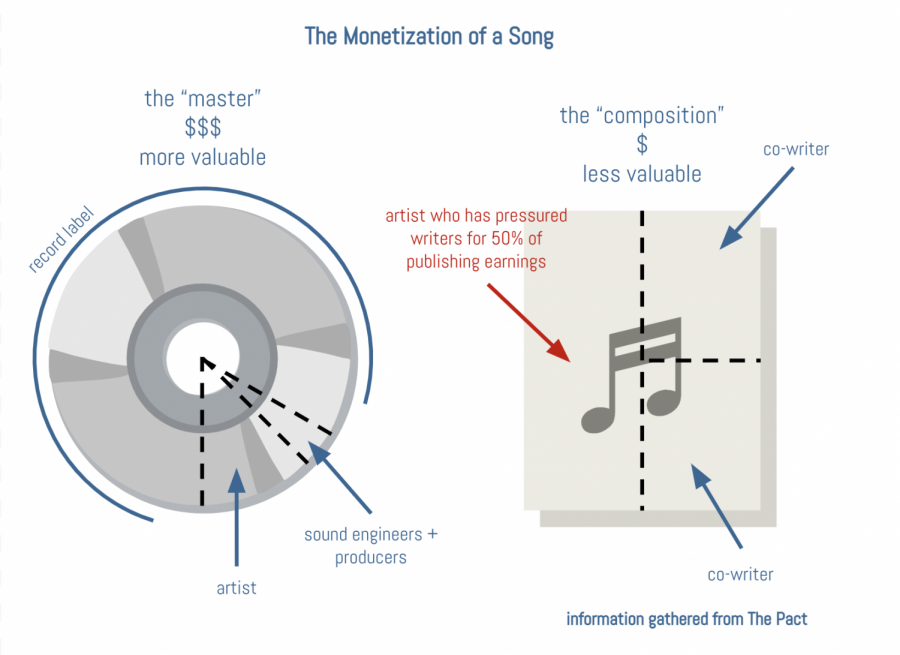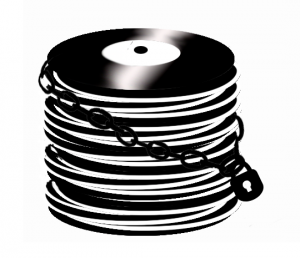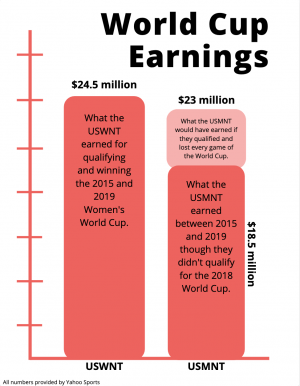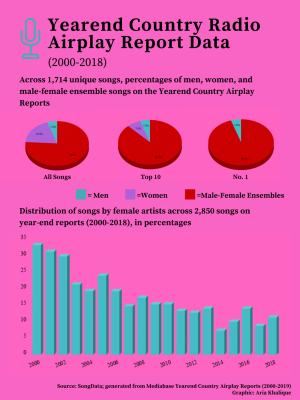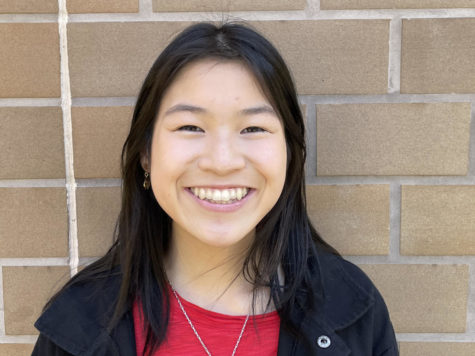Songwriters speak out about unfair treatment within the music industry
In the United States, a campaign called The Pact describes how artists can demand publishing revenue on songs they did not write, leaving songwriters with just a margin of the revenue stream.
May 26, 2021
Behind every popular song is an infectious melody, soulful lyric, or catchy chorus, carefully crafted by one or more talented songwriters. But now more than ever, songwriters are coming forward to speak out about unfair treatment within the music industry by both artists and record labels. Two simultaneous movements are now taking place in the United States and Europe to call for fairer standards.
The first campaign surrounds a group of some of the industry’s most in-demand songwriters. They posted an open letter called The Pact in late March, describing how artists use “bully tactics and threats” to demand publishing revenue on songs they did not write, taking a portion of the profits from the songwriters. The letter states, “This body of songwriters will not give publishing or songwriting credit to anyone who did not create or change the lyric or melody or otherwise contribute to the composition without a reasonably equivalent/meaningful exchange for all the writers on the song,” in an effort to give these writers, and those in future generations, the credit they deserve.
On The Pact’s Instagram page, it’s explained in further depth how artists can take advantage of a songwriter’s fair share on the revenue of a song. While artists generate revenue from not just their songs, but also touring, televised performances, merch, and more, songwriters only make money on the publishing, also known as the composition, of a song, which are written lyrics and melodies.
The publishing isn’t even the fully monetized form of an individual song; while the publishing deals earnings for lyrics and melody through royalties, the “master,” or actual recording of the song, is what actually benefits from streaming, physical sales, and digital downloads, and as a result is the more valuable of the two.
According to The Pact, the problem lies in the fact that songwriters are continually pressured into giving up some of their publishing earnings, sometimes up to 50%, to artists who had no hand in penning the actual lyrics or melodies of the song (see figure). They state that these writers must “give up their smaller piece of the smaller pie” to artists who did not contribute in writing their songs.
Signees of The Pact include Emily Warren (who has penned hits by Dua Lipa and the Chainsmokers), Justin Tranter (Selena Gomez, Demi Lovato), and Victoria Monét (Ariana Grande, Fifth Harmony). An interview with Rolling Stone explained how “a high-powered singer was demanding a ‘crazy’ fraction of publishing — the income that writers earn from creating the lyrics and melodies for songs — in exchange for recording a tune penned by Warren, even though that artist had not contributed to the writing process in any way.”
This can cause huge pay discrepancies, as a Houston Chronicle article claims that each digital download or physical unit of a song sold can only make a songwriter $0.091 in the United States. Further, The Pact claims that a song must be digitally streamed 10,000 times to generate just $2 for a writer, though these numbers vary based on publishing deals, the number of songwriters on each song, and many other factors.
It’s worth noting that in the most popular of songs, these figures can grow exponentially. Dan Wilson, a co-writer on Adele’s 2011 hit “Someone Like You,” allegedly made $882,700 in songwriting royalties in just the first year after the song’s release. It’s unclear how much Adele herself made on the song, but her album “21,” containing that single, earned her a whopping $67 million in its first two years, approximately.
But for the average song, these payouts tend to be miniscule streams of revenue for writers who don’t sing or produce music, so Warren added that it is especially vital to support less renowned songwriters who may have less of an ability to stick up for themselves to receive a fair share in the studio.
“If we can all join together, A) we have leverage, and B) the threat [artists] use — ‘we’ll go find another song if you don’t agree to this’ — can be removed,” she said.
The second concurrent movement to support songwriters is spearheaded by the Ivors Academy, an independent body of professional songwriters in the United Kingdom. It’s leading the #PaySongwriters campaign to call for writers to be paid a minimum daily allowance of £75 ($120) to cover costs and to give writers a minimum of four points (percent) on the master for each song they help pen. Though some of the rules surrounding the pay of songwriters differ across the pond, the underlying message of fighting inequality remains the same.
The #PaySongwriters open letter, written by the Ivors Academy Chair of the Songwriter Committee, Helienne Lindvall, criticizes the record industry’s failure to modernize to support the needs of songwriters in the digital age.
“100,000 streams of a song will not cover the price of a cup of coffee. A songwriter could have many millions of streams and still be incapable of making rent in the cities where their work is done … We can see that the record industry has experienced a huge upturn in revenues whilst songwriter profits have collapsed. There is a sincere danger that we may lose a whole class of writers before people truly comprehend the situation and the model is fixed,” the letter states.
Signees of the open letter include songwriters Autumn Rowe (Dua Lipa, Ava Max) and Steve Mac (Ed Sheeran, One Direction).
As reported by NME on April 27, Rowe said in a #PaySongwriters statement, “I’m at the point where I rather not write at all then take a session for an artist without a sound yet and no real plan of action…Too often it’s normalised that writers are supposed to write for free with an artist because something might happen a couple years down the line. I can’t continue to pay to develop other people’s brands which I have no personal stake in.”
Both campaigns have gained significant press in the weeks since their open letters have been published, and each new supporter brings them a bit closer to reaching their goals. The Pact and the #PaySongwriters movement may take place on different continents and have different motivations, but they are united by their shared goal of helping professional songwriters receive fair treatment by artists and record labels within the lucrative, merciless nature of the music industry.

